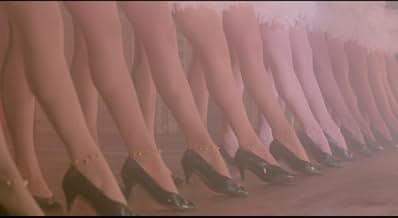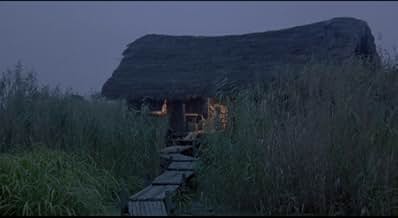AVALIAÇÃO DA IMDb
7,1/10
6,3 mil
SUA AVALIAÇÃO
Adicionar um enredo no seu idiomaA provincial boy related to a Shanghai crime family is recruited by his uncle into cosmopolitan Shanghai in the 1930s to be a servant to a ganglord's mistress.A provincial boy related to a Shanghai crime family is recruited by his uncle into cosmopolitan Shanghai in the 1930s to be a servant to a ganglord's mistress.A provincial boy related to a Shanghai crime family is recruited by his uncle into cosmopolitan Shanghai in the 1930s to be a servant to a ganglord's mistress.
- Direção
- Roteiristas
- Artistas
- Indicado a 1 Oscar
- 5 vitórias e 4 indicações no total
- Direção
- Roteiristas
- Elenco e equipe completos
- Produção, bilheteria e muito mais no IMDbPro
Avaliações em destaque
A young boy is brought to 1930's Shanghai from the countryside to be the manservant of a gang boss's mistress. The mistress (Gong Li) is a glamourous nightclub singer and a royal bitch. Soon after he arrives, the boy is witness to a power play in the underworld that results in the uncovering of lots of treachery and quite a bit of violence.
It's a nicely constructed story with good acting from everybody involved. It's fairly straightforward, but satisfying, and seeing the gang land activity from the perspectives of two outsiders makes it all the more interesting.
SHANGHAI TRIAD became my favourite Zhang Yimou film when I saw it some years ago, for the simple reason that it was one of the most beautiful films I'd seen. The production design, costumes, lighting and camerawork are all quite remarkable - creating stunning images from the opulence of Shanghai's nightclubs and mansions to the simplicity of the rural island where the second half of the film takes place.
Unfortunately, the R1 DVD fails to do the film justice. The colours are far too subdued, giving the film a rather lifeless look, and the demon of the digital age, Edge Enhancement, rears its ugly head again. The result looks rather like a VHS transfer, but I'd swear in court that the film looked a lot better on my UK VHS copy (mainly because of the colours). Poor Zhang Yimou, he hardly ever seems to get good representation on DVD.
The film is recommended for fans of Zhang Yimou or Gong Li, though without the vibrant cinematography the film wouldn't be ranked as his best by many people. If you've already got the film on VHS, it's not worth "upgrading" to the DVD though.
It's a nicely constructed story with good acting from everybody involved. It's fairly straightforward, but satisfying, and seeing the gang land activity from the perspectives of two outsiders makes it all the more interesting.
SHANGHAI TRIAD became my favourite Zhang Yimou film when I saw it some years ago, for the simple reason that it was one of the most beautiful films I'd seen. The production design, costumes, lighting and camerawork are all quite remarkable - creating stunning images from the opulence of Shanghai's nightclubs and mansions to the simplicity of the rural island where the second half of the film takes place.
Unfortunately, the R1 DVD fails to do the film justice. The colours are far too subdued, giving the film a rather lifeless look, and the demon of the digital age, Edge Enhancement, rears its ugly head again. The result looks rather like a VHS transfer, but I'd swear in court that the film looked a lot better on my UK VHS copy (mainly because of the colours). Poor Zhang Yimou, he hardly ever seems to get good representation on DVD.
The film is recommended for fans of Zhang Yimou or Gong Li, though without the vibrant cinematography the film wouldn't be ranked as his best by many people. If you've already got the film on VHS, it's not worth "upgrading" to the DVD though.
This story is told through the eyes of a boy who has just begun working as an underling for a Chinese mobster in the 1930s. It seems the young man is the servant to the mistress of the triad chief and he is treated, at times, more like a slave than a person. The lady is quite beautiful but also seemed very petulant and foolish throughout the film--making it very surprising indeed that this boy bonded so quickly with the lady. Had I been in the boy's place, I probably would have taken the first chance to either poison her or run!
SHANGHAI TRIAD was nominated for the Best Cinematography Oscar and this certainly isn't surprising when you see this film. It's actually pretty rare for a foreign film to get this nomination, but this movie was one of the most artistic films I have seen in ages. The camera-work is great--with the wonderful use of filters, excellent framing techniques and grand colors.
Unfortunately, while the film is very beautiful, the story itself is too often sterile and one of its main characters (played by Gong Li) is just too unlikable--seeming like a complete brat. While the mob boss is quite amoral and vicious, at least you didn't find yourself hating him quite as much--especially since he was a smart guy. Additionally, all too often, events occur off-screen and you only hear about them or catch glimpses of the results--giving the film very little energy. Fortunately, despite being slow, the film does end very well with some interesting twists--but not quite enough to redeem the film. Overall, it's very watchable but with more energy and a more involving story, it could have been so much better.
SHANGHAI TRIAD was nominated for the Best Cinematography Oscar and this certainly isn't surprising when you see this film. It's actually pretty rare for a foreign film to get this nomination, but this movie was one of the most artistic films I have seen in ages. The camera-work is great--with the wonderful use of filters, excellent framing techniques and grand colors.
Unfortunately, while the film is very beautiful, the story itself is too often sterile and one of its main characters (played by Gong Li) is just too unlikable--seeming like a complete brat. While the mob boss is quite amoral and vicious, at least you didn't find yourself hating him quite as much--especially since he was a smart guy. Additionally, all too often, events occur off-screen and you only hear about them or catch glimpses of the results--giving the film very little energy. Fortunately, despite being slow, the film does end very well with some interesting twists--but not quite enough to redeem the film. Overall, it's very watchable but with more energy and a more involving story, it could have been so much better.
First of all, I'm a huge fan of Gong Li.
"Shanghai Triad" one of my favourites out of her movies. 'Favourite' in my definition applies only when I want to watch a film again and again and liking it more everytime I watch it.
"Shanghai Triad" is a beautiful movie, with a clever plot developed within the time frame of a mere seven days. The depth of character also adds to the brilliance of the film. The character of "Xiao Jingbao" (sometimes translated as "Bijou") played by Gong Li at first seems shallow, as she is a chanteuse and moll of a powerful gangster. As her character develops, one recognises that underneath her materialistic values imposed upon her by society, lies a very pure nature. The discovery of the depth of her characterisation is especially moving, and propels towards an emotional climax, during which tragedy arouses sympathy and anguish.
The little boy in the movie is also noted for his excellent performance. He silently dominates the atmosphere of the film, looking on without speech, but secretly and strongly decided in the mind. He acts as the eye through which we see the world in the movie.
Apart from all the technical approval and standardised appraisal of the movie, I have to add I also loved Gong Li's singing in the movie. Yes, it was actually her singing! Her singing is just as beautiful as herself and her performances. Watch her dance and sing elegantly on stage, not one moment has she been not charming in the movie.
On the director's part, this is a very different film from all other previous Zhang Yimou films. But like all his other films, the story is meaningful and the cinematography is breath-taking.
Some more little background facts about the movie: during the making of the film, neither Gong Li nor director Zhang Yimou was in particularly good mood. And that was because, if you know about Gong Li and Zhang Yimou's relationship before, they broke up. Reason? Well, in short, Zhang Yimou's a workaholic, and Gong Li like any other woman, wanted security and family which he was unable to give. And interestingly, and sarcastically (in our point of view), there was a scene in the movie where Gong Li was chatting with the woman peasant. The peasant thought Gong Li was already married, but she said no. With surprise, the peasant said by this age she should be getting married. Gong Li said "Yes, I should be getting married. But do I know who to get married to?"
Of course Gong Li is married now, to a Singaporean business man.
Getting back to the movie, it's just a classic. It's visually absorbing, narratively ingenius, audibly satisfising, emotionally powerful, and just speechlessly amazing. If one can love a movie, I love this movie.
"Shanghai Triad" one of my favourites out of her movies. 'Favourite' in my definition applies only when I want to watch a film again and again and liking it more everytime I watch it.
"Shanghai Triad" is a beautiful movie, with a clever plot developed within the time frame of a mere seven days. The depth of character also adds to the brilliance of the film. The character of "Xiao Jingbao" (sometimes translated as "Bijou") played by Gong Li at first seems shallow, as she is a chanteuse and moll of a powerful gangster. As her character develops, one recognises that underneath her materialistic values imposed upon her by society, lies a very pure nature. The discovery of the depth of her characterisation is especially moving, and propels towards an emotional climax, during which tragedy arouses sympathy and anguish.
The little boy in the movie is also noted for his excellent performance. He silently dominates the atmosphere of the film, looking on without speech, but secretly and strongly decided in the mind. He acts as the eye through which we see the world in the movie.
Apart from all the technical approval and standardised appraisal of the movie, I have to add I also loved Gong Li's singing in the movie. Yes, it was actually her singing! Her singing is just as beautiful as herself and her performances. Watch her dance and sing elegantly on stage, not one moment has she been not charming in the movie.
On the director's part, this is a very different film from all other previous Zhang Yimou films. But like all his other films, the story is meaningful and the cinematography is breath-taking.
Some more little background facts about the movie: during the making of the film, neither Gong Li nor director Zhang Yimou was in particularly good mood. And that was because, if you know about Gong Li and Zhang Yimou's relationship before, they broke up. Reason? Well, in short, Zhang Yimou's a workaholic, and Gong Li like any other woman, wanted security and family which he was unable to give. And interestingly, and sarcastically (in our point of view), there was a scene in the movie where Gong Li was chatting with the woman peasant. The peasant thought Gong Li was already married, but she said no. With surprise, the peasant said by this age she should be getting married. Gong Li said "Yes, I should be getting married. But do I know who to get married to?"
Of course Gong Li is married now, to a Singaporean business man.
Getting back to the movie, it's just a classic. It's visually absorbing, narratively ingenius, audibly satisfising, emotionally powerful, and just speechlessly amazing. If one can love a movie, I love this movie.
This is a fine movie - wonderfully acted, beautifully shot, quite simple. Without being heavy-handed, one comes to sense the presence of real evil that tempts and corrupts and destroys. It's a little slow at times because the story is so simple - yet the slowness and simplicity does allow the messages of the movie to hit home. Something else I like is that the protagonist boy is not made to be cute or winning - he just is who he is - largely an observer but sometimes acting with generosity and sometimes with contempt.
Much has been said by others about the beautiful cinematography and that's certainly true - but I'm also struck by the amazing work of those who constructed or chose the sets, costumes, background characters - they were quite memorable. What a star in Gong Li, and what a director!
I don't agree with those who contrast this with American movies - surely we feel the same evil in watching either version of Scarface or The Petrified Forest or The Road to Perdition.
In fact, I would say this movie is most like The Road to Perdition of any I've seen - not in its story particularly but in its tone, its simplicity, its contrasts of character, its cinematography.
This is also a good movie for those who say they don't like foreign movies - you'll like this one.
Much has been said by others about the beautiful cinematography and that's certainly true - but I'm also struck by the amazing work of those who constructed or chose the sets, costumes, background characters - they were quite memorable. What a star in Gong Li, and what a director!
I don't agree with those who contrast this with American movies - surely we feel the same evil in watching either version of Scarface or The Petrified Forest or The Road to Perdition.
In fact, I would say this movie is most like The Road to Perdition of any I've seen - not in its story particularly but in its tone, its simplicity, its contrasts of character, its cinematography.
This is also a good movie for those who say they don't like foreign movies - you'll like this one.
The big plus here is in the visual department It is gorgeously filmed with deep, rich colors.
The story isn't that much. You keep excepting it to get better. It holds that promise but doesn't deliver until the ending, which has a neat no-nonsense twist. I really liked and admired that ending and wish more movies had realistic finishes like this.
Gong Li, who stars in here, plays a character that is interesting for the first half of the film but her spoiled-brat routine gets annoying after awhile. The main gangster, however, is an interesting guy throughout.
I've watched this twice and, frankly, expected more both times.
The story isn't that much. You keep excepting it to get better. It holds that promise but doesn't deliver until the ending, which has a neat no-nonsense twist. I really liked and admired that ending and wish more movies had realistic finishes like this.
Gong Li, who stars in here, plays a character that is interesting for the first half of the film but her spoiled-brat routine gets annoying after awhile. The main gangster, however, is an interesting guy throughout.
I've watched this twice and, frankly, expected more both times.
Você sabia?
- CuriosidadesThis was a difficult film for Yimou Zhang to make. His relationship with his leading lady Gong Li was coming to an acrimonious end and the Chinese authorities were deliberately hassling him with complicated and elusive work permits. That was mainly because they were still annoyed with him for submitting his previous film Tempo de Viver (1994) to the Cannes Film Festival without their permission.
- Citações
Xiao Jingbao: [to Song] Just because you fucked me you think you're the boss?
- ConexõesFeatured in 53rd Annual Golden Globe Awards (1996)
Principais escolhas
Faça login para avaliar e ver a lista de recomendações personalizadas
- How long is Shanghai Triad?Fornecido pela Alexa
Detalhes
- Data de lançamento
- Países de origem
- Idioma
- Também conhecido como
- Shanghai Triad
- Locações de filme
- Xangai, China(location)
- Empresas de produção
- Consulte mais créditos da empresa na IMDbPro
Bilheteria
- Faturamento bruto nos EUA e Canadá
- US$ 2.086.101
- Fim de semana de estreia nos EUA e Canadá
- US$ 209.098
- 25 de dez. de 1995
- Faturamento bruto mundial
- US$ 2.086.101
Contribua para esta página
Sugerir uma alteração ou adicionar conteúdo ausente





























